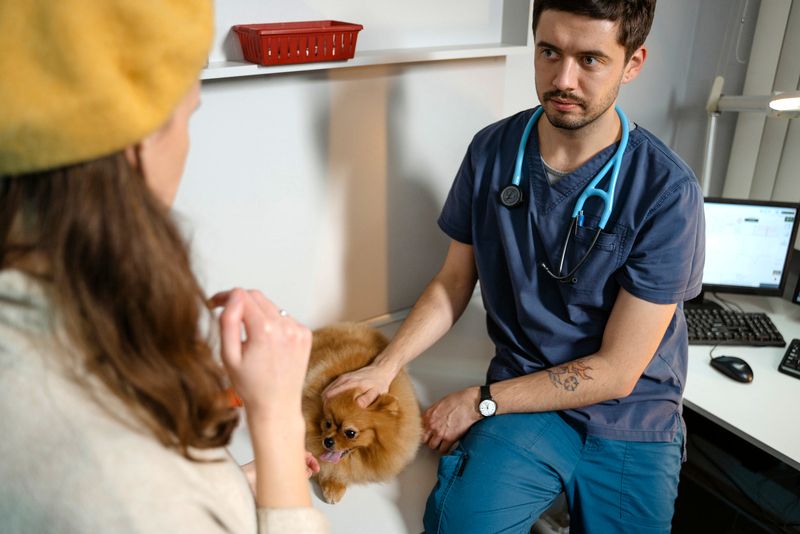Dog diarrhoea, how to help

According to the American Kennel Club, over 40% of pet owners have experienced dog diarrhea at least once in their pet's life. This statistic underscores the prevalence and importance of understanding this common issue.
The Causes of Dog Diarrhea
Dog diarrhea can be caused by a variety of factors, ranging from dietary indiscretion to serious health conditions. Here are some of the most common causes:
- Dietary Indiscretion: This occurs when your dog eats something that doesn't belong in their diet, such as garbage or spoiled food.
- Food Allergies: Certain ingredients can trigger an allergic reaction leading to diarrhea. Common culprits include beef, chicken, dairy, and wheat.
- Parasites: Parasitic infections like roundworms, tapeworms, or giardia are common causes of diarrhea in dogs.
- Infections: Bacterial or viral infections can lead to gastrointestinal distress, causing diarrhea.
- Stress: Emotional stress from changes in environment, routine disruptions, or other factors can also result in digestive issues.
Determining the Cause of Diarrhea
The first step in addressing dog diarrhea is identifying its cause. This involves a thorough examination and possibly some diagnostic tests:
- Observation: Pay attention to your dog's behavior, diet, and any recent changes in their environment.
- Veterinary Consultation: A veterinarian can provide an accurate diagnosis through physical exams and lab tests.
Treatment Strategies for Dog Diarrhea
The treatment for dog diarrhea varies depending on the underlying cause. Here are some effective strategies:
Dietary Indiscretion
- Remove any toxic or spoiled food from your pet's environment.
- Feed a bland diet consisting of boiled chicken and rice until symptoms subside.
Food Allergies
- Identify the allergen through elimination diets.
- Switch to hypoallergenic dog food or foods with limited ingredients.
Parasites
- Deworming: Administer deworming medication prescribed by your vet.
- Environmental Control: Clean and disinfect areas where parasites may be present.
Infections
- Bacterial Infections: Antibiotics prescribed by a veterinarian are often necessary.
- Viral Infections: Supportive care, hydration, and anti-inflammatory medications may be recommended.
Stress-Induced Diarrhea
- Reduce Stressors: Identify and eliminate stress triggers in your dog's environment.
- Pet Calming Aids: Consider using calming aids like pheromone sprays or CBD oil.
Maintaining Proper Hydration and Nutrition
Regardless of the cause, it is crucial to ensure your dog stays hydrated and receives proper nutrition. Here are some tips:
- Monitor Water Intake: Ensure your pet has access to clean water at all times.
- Bland Diet: Feed a bland diet of easily digestible foods like boiled chicken and rice until symptoms improve.
When Should You See a Vet?
If the diarrhea persists for more than 24 hours or is accompanied by other severe symptoms, it's time to seek professional help:
- Persistent Diarrhea: If your dog has had loose stools for over two days.
- Blood in Stools: Any sign of blood warrants an immediate vet visit.
- Lethargy or Loss of Appetite: These are signs that the diarrhea may be a symptom of a more serious condition.
Taking Preventative Measures Against Diarrhea
To prevent future episodes, consider these proactive steps:
- Vaccinations and Parasite Control: Keep up with your dog's vaccinations and regular deworming.
- Balanced Diet: Feed a high-quality diet tailored to your pet’s specific needs.
Conclusion: A Holistic Approach to Managing Dog Diarrhea
Dog diarrhea is a common issue that can stem from various causes, ranging from dietary indiscretion to serious health conditions. By understanding the underlying cause and implementing appropriate treatment strategies, you can effectively manage your dog's symptoms and prevent future episodes.
Takeaways:
- Determine the Cause: Identify whether the diarrhea is due to diet, allergies, parasites, infections, or stress.
- Tailor Treatment: Choose a treatment plan based on the specific cause of your dog's diarrhea.
- Maintain Hydration and Nutrition: Ensure your pet stays hydrated and receives proper nutrition during episodes of diarrhea.
- Schedule Vet Visits: Consult with a veterinarian if symptoms persist or worsen.
By following these guidelines, you can help ensure that your dog remains healthy and happy. Remember, early intervention is key to managing and preventing dog diarrhea effectively.
